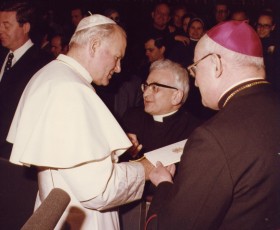Our story

The “Follow Me” Group was founded in Rome on March 19, 1965. The preparatory phase of the foundation involved for about a decade a group of students from Modena and their teachers of Religion, Paola Majocchi and Irma Gaspari, with Christian and social experiences in full synergy with the pre conciliar climate: people and not works as the main purpose, love for Christ as a key to reading and response to personal and universal history, consecrated secularism, freedom of initiative and the need for communion among members, attraction to the world in all its forms and needs, the avant-garde secular apostolate, spiritual growth in symbiosis with cultural one, associative freedom. The desire of some to live their baptism in a radical way, until the consecration to God of all life, required an adequate ecclesiastical legal configuration that took place at the hands of Father Anastasio Gutiérrez, a Claretian religious, expert canonist university professor. The specific contribution of Father Gutiérrez and Paola Majocchi in the definition of Follow me made me recognize in both, immediately, the role of founders.
Approved on June 21, 1965 as a “pious union” by Mons. Abele Conigli, Bishop of Sansepolcro (Arezzo), maintained this configuration until 19 March 1984, when the Decree of the Pontifical Council for Laymen approved Follow me as an “international association of the faithful” of papal law. With the new Code of Canon Law of 1983, Follow me is a mixed lay association (can. 298 th 1), private (can. 299), with legal personality (can. 322 th 1), papal law, in fact and universal law and with central government (can. 322 th 2 and Can. 312 th 1, 1st), agreed (Concordate 1984, article 7 – 2).
In the varied and multifaceted framework of associations, movements and church groups, characteristic of the Church of the post-council, Follow me wanted to call itself “group” to emphasize the free, open and dynamic associative dimension.
Follow me is currently present in about 20 centers distributed in Italy (Rome, Modena and Naples), Spain (Palencia), Democratic Republic of Congo (Kananga, Kalemba Mulumba, Bena Mande), Cameroon (Yaoundé), Burundi (Bujumbura) with over a thousand people.
Tuesday’s Mass at Casa Vince. All invited!!
Let us stop together and enjoy the essentials in prayer...
Follow me to the U.S.A.
From July 15 to August 15, 2019, unmarried consecrated...
Way of Santiago
After ten days of walking and 12 kilometers on foot with a...
